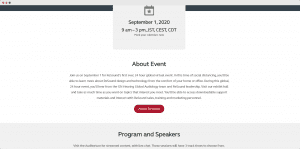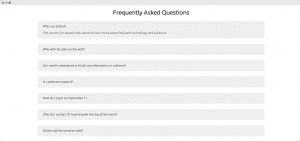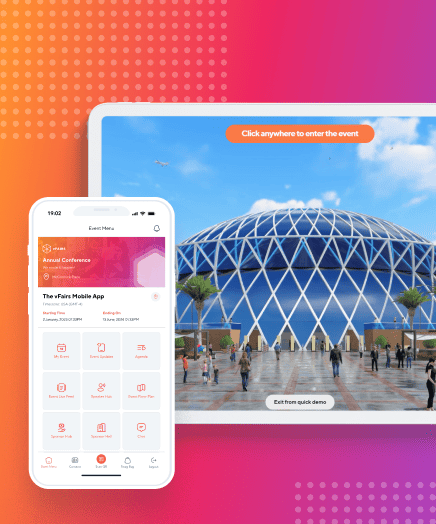We’ve finally reached the end of 2020 and gosh, wasn’t that a roller coaster ride?
Amid all the “what if’s” and “what now’s”, businesses and organizations jumped onto the virtual events bandwagon, only to explore the many hidden opportunities that the year 2020 unveiled for them. However, finding the key is one thing, but using it for the right lock is another.
While everyone knew a virtual event was the key to success, not all of them were able to execute it in a way to reap all the benefits from it. Now we know that when planned and executed properly, going virtual opens up the world for you.

In this article, we’ll therefore be highlighting the most common virtual event planning mistakes that were made by organizers and virtual event providers in 2020.
Mistake #1. Building an event is enough to attract your audience
As an event organizer, you may have focused all your resources on setting up an extraordinary event. However, just like an in-person event, unless you make some noise about it, no one will know it’s happening.
Your virtual event planning checklist must include promotional activities in order to drive as much audience towards your event as possible. After all, going virtual opens up the world for you, so why hold back?

Mistake #2. “If I know it, they know it too”
No, they don’t.
Organizers often tend to understate their value within virtual event descriptions and goals with the assumption that their audience might somehow be aware of the “how’s” and the “why’s”. Let us remind you, your event does not mean the same to person A as it does to person B. It might not be your first, but it most probably is theirs. So, during your virtual event planning, you need to consider the information that is most valuable to your audience.
A few ways of extending information and compelling them to sign up are:
- Including the description of the event on your landing page. What should your audience expect from your virtual event? What is the value that you’re offering on an online platform? Remember your audience is absolutely unaware of what they’re signing up for, so rid them of their confusions and help them get comfortable with your virtual event.

- Creating a target persona of your ideal attendee and preparing marketing materials that speak to them. Who is the event for? Why should they attend it? Spell it all out for them.
- Providing answers to common queries before your audience even asks. Since you’re offering an interactive platform with a real-time experience (and not just a static webpage), provide your visitors with all of the information they need to plan their journey. How can I register for the event? Do I need a microphone to interact with exhibitors? Do I need to stay online for the whole event? Adding a segment with FAQs will help audiences pre-plan and get more confident about attending your virtual event.

Mistake #3. Skipping the final run-through
A lot of virtual event organizers build their event and jump right into it on the day of the event. Simply put — that’s the recipe to sabotaging your own event.
It is absolutely essential to save some time to do a test run of your virtual event. Virtual events are a fairly new concept for a lot of people, and therefore it is highly recommended to make sure your team and all other participating bodies prepared well enough, prior to the day of the event. This involves practicing with speakers in case of live sessions and checking for any technical hiccups to cater to them in advance.

Mistake #4. Not offering sufficient support to exhibitors
One of the most important aspects of the success of your virtual event is the feedback you get from exhibitors. Make sure you don’t leave them hanging. Instead, introduce them to the ways they can create opportunities for themselves by participating in your event.
vFairs offers a self-service booth builder for exhibitors to select different booth templates, set up their own graphics, and add various types of content for their visitors to consume. If need be, our dedicated support team is available round the clock to solve any queries that may exist.
Not just that, exhibitors would also like to understand how they’re performing, during and after the event. Ask your virtual event provider for detailed reports based on booth visits, downloads, etc, in order to share them with your exhibitors and help them track their performance.
Mistake #5. Failing to partner with a reliable virtual events provider
Most importantly, your virtual event planning should begin with partnering with a trustworthy platform. Let’s be honest — this is truly what makes or breaks your virtual event.
While researching for a reliable platform, remember to look for the following:
- Customer reviews on the company website
- Reviews on third-party platforms such as Capterra and G2
- Customer support capabilities and round-the-clock availability

Mistake #6. Not considering hidden costs or add-on options
A large portion of virtual event planning consists of budgeting. You need to be able to justify the costs that you are incurring for the benefits that you are expecting. Make sure the cost of every feature you’re opting for has been communicated to you prior to committing to a certain virtual event platform.

Next Steps
Virtual event planning is critical to the success of each event. This practice is however incomplete without identifying previous mistakes and preventing them taking place in the future.
As we open ourselves up to the New Year, 2021, there’s no doubt we’d all love to focus on setting up bigger and better virtual events. So get in touch right away!
You might also be interested in: 12 Best Practices for Hosting a Virtual Event


